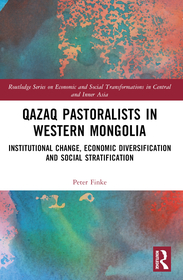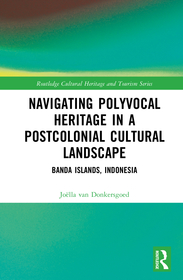
Qazaq Pastoralists in Western Mongolia
Institutional Change, Economic Diversification and Social Stratification
Series: Routledge Series on Economic and Social Transformations in Central and Inner Asia;
- Publisher's listprice GBP 39.99
-
19 105 Ft (18 195 Ft + 5% VAT)
The price is estimated because at the time of ordering we do not know what conversion rates will apply to HUF / product currency when the book arrives. In case HUF is weaker, the price increases slightly, in case HUF is stronger, the price goes lower slightly.
- Discount 10% (cc. 1 911 Ft off)
- Discounted price 17 194 Ft (16 376 Ft + 5% VAT)
Subcribe now and take benefit of a favourable price.
Subscribe
19 105 Ft

Availability
Estimated delivery time: In stock at the publisher, but not at Prospero's office. Delivery time approx. 3-5 weeks.
Not in stock at Prospero.
Why don't you give exact delivery time?
Delivery time is estimated on our previous experiences. We give estimations only, because we order from outside Hungary, and the delivery time mainly depends on how quickly the publisher supplies the book. Faster or slower deliveries both happen, but we do our best to supply as quickly as possible.
Product details:
- Edition number 1
- Publisher Routledge
- Date of Publication 18 December 2024
- ISBN 9780367709563
- Binding Paperback
- No. of pages256 pages
- Size 234x156 mm
- Weight 470 g
- Language English
- Illustrations 23 Illustrations, black & white; 23 Halftones, black & white; 10 Tables, black & white 731
Categories
Short description:
This book looks at the first longitudinal analysis of the Qazaqs in Mongolia and is a contribution to anthropological theories of economic & social inequalities & institutional change, useful for Cent. Asian Studies, Anthropology, Human Geography & Dev. Studies.
MoreLong description:
Taking the case of Qazaq Pastoralists in Western Mongolia, this book looks at the universal human requirement to balance individual flexibility and strategies designed to make a living with the social expectations that impose particular rules of conduct but also enable mutual trust and cooperation to emerge.
Pastoralists in Western Mongolia have experienced dramatic changes in recent decades, including the dismantling of the socialist economy, a series of natural disasters, and an emigration of roughly half of the local Qazaq minority to the newly independent state of Qazaqstan. Four aspects illustrate the chances and challenges that people face. First is the emergence of the market as the dominant mode of production and exchange, a thorny way full of uncertainties. Second is the individual household and its adaptation to the new economic system, creating new opportunities as well as precarities, and resulting in rapid social stratification. Thirdly, patterns of pastoral land allocation highlight problems of collective action and institutional fragmentation in the wake of a retreating state apparatus. Finally, social networks of mutual support and cooperation constitute a key component of pastoral livelihood but are under great pressure due to short time horizons and a lack of trust.
The first longitudinal analysis of the Qazaqs in Mongolia in English and a contribution to anthropological theories on human adaptability and decision-making, economic and social inequalities, institutional change and the difficulty of deriving at cooperative solutions, this book will be a standard work and of interest to academics in the field of Central Asian Studies, Anthropology, Human Geography and Development Studies.
MoreTable of Contents:
Acknowledgment; Transliteration; Chapter 1: Systems Come and Go; Chapter 2: A Portrait of Khovd-sum; Chapter 3: Changing Regimes of Production and Exchange; Chapter 4: Making ends meet; Chapter 5: Using space and mobility; Chapter 6: Social webs and hierarchies; Chapter 7: Flexibility and adaptation in pastoral decision-making; Bibliography
More





